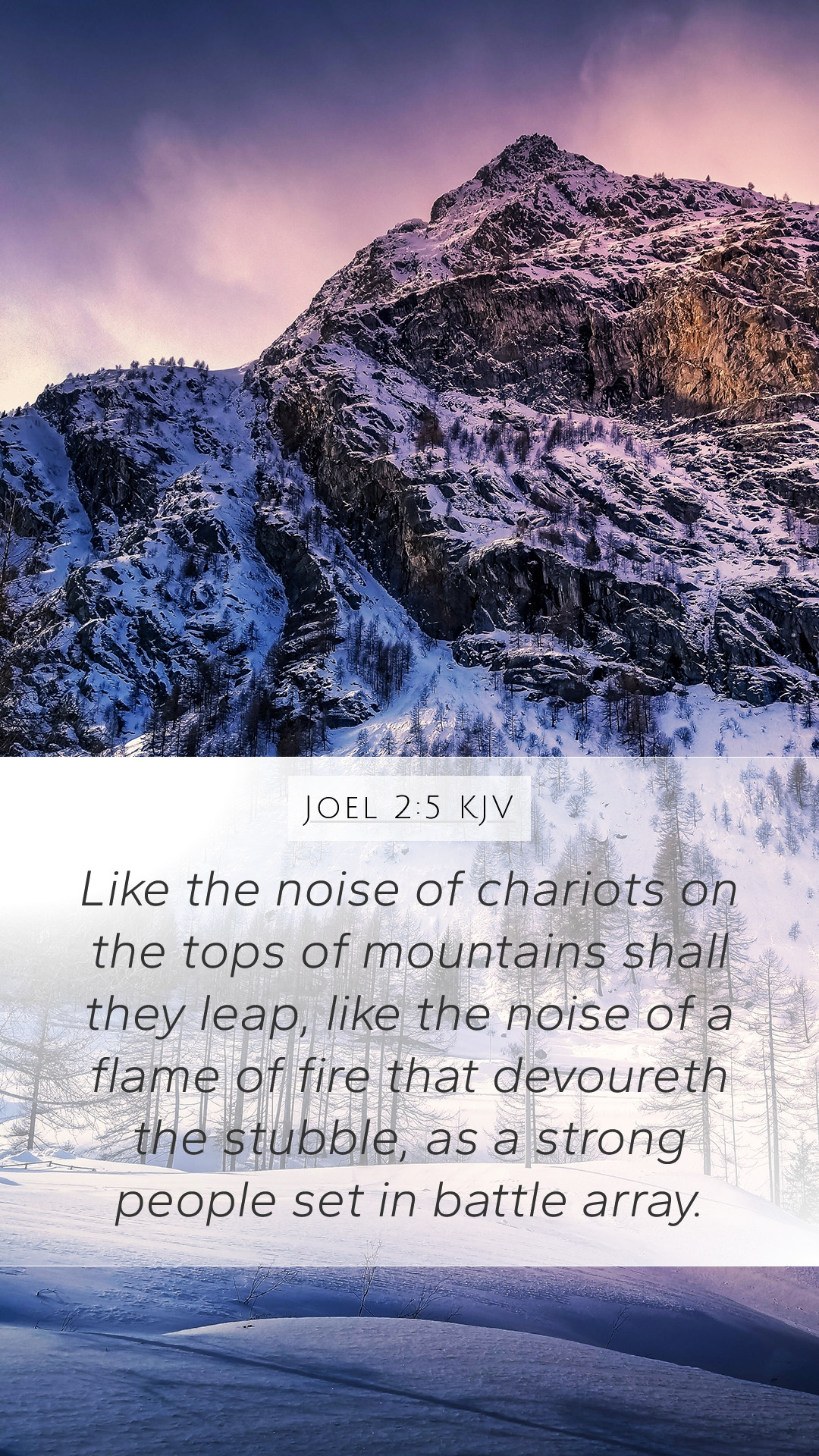Understanding Joel 2:5
Joel 2:5 states: "Like the noise of chariots on the tops of mountains shall they leap, like the noise of a flame of fire that devoureth the stubble, like a mighty people set in battle array." This verse conveys a vivid image of an approaching army, characterized by its intensity and power. Below, we explore the various interpretations and meanings as drawn from noted public domain commentaries by Matthew Henry, Albert Barnes, and Adam Clarke.
Bible Verse Meanings
This verse is often viewed as a prophetic message detailing the overwhelming force of an invading army or a metaphorical representation of divine judgment. The language indicates urgency and impending action, capturing the reader’s attention with its descriptive comparisons to natural phenomena and war-like imagery.
Matthew Henry's Commentary
Matthew Henry highlights the alarming nature of the sounds described in this verse. He notes that the mention of chariots and flames suggests a sudden and fierce invasion. In this light, the verse stands not only as a historical prophecy concerning Israel’s enemies but also as an illustration of God’s judgment upon sin. This also relates to the spiritual renewal that God offers amidst devastation.
Albert Barnes' Exegesis
Albert Barnes emphasizes the metaphorical significance of the ‘noise of chariots’ and the ‘flame of fire.’ He explains that these comparisons signify not just the literal destruction brought by armies but also the divine purpose behind these occurrences. Barnes points out the dual nature of God's work in judgment and mercy, suggesting that even in destruction, there is an invitation to repentance and restoration.
Adam Clarke's Insights
Adam Clarke provides a dive into the historical context, relating the verse to the events surrounding the locust plague described earlier in Joel. Clarke interprets the ‘mighty people’ as representing the forces of nature or invading armies, drawing parallels between earthly and spiritual significance. He also encourages readers to reflect upon the spiritual warfare that mirrors these physical battles.
Scripture Analysis
In analyzing Joel 2:5, we recognize various layers of meaning:
- Imagery of Destruction: The imagery suggests that the advance of the army is inevitable and destructive, symbolizing God's retribution against unrepentant nations.
- Call to Repentance: The verse acts as a reminder of the urgency for Israel to turn back to God before the judgment comes.
- God’s Sovereignty: Emphasizes God's control over creation and history, showcasing His ability to use even calamity for His divine purpose.
Applying Bible Verse to Daily Life
As we reflect on Joel 2:5, we can draw lessons for our daily lives:
- Awareness of Consequences: The verse serves as a reminder that actions have consequences, and one must always consider the spiritual implications.
- Preparedness: Just as an army prepares for battle, we must be spiritually prepared to face the challenges in life.
- Urgency for Repentance: It encourages individuals to take the call for repentance seriously, fostering a deeper relationship with God.
Bible Study Insights
For those seeking further understanding and commentary on this verse, many Bible study resources are available. Here are some suggestions for study groups:
- Bible Study Groups focusing on the Book of Joel
- Online Bible Study Platforms offering detailed verse-by-verse analyses
- Bible Study Guides addressing the themes of prophecy and judgment
Cross References
This verse connects well with:
- Isaiah 5:30 - "And they shall roar against them like the roaring of the sea." This verse similarly depicts imagery of noise and impending judgment.
- Revelation 9:9 - "And they had breastplates, as it were breastplates of iron; and the sound of their wings was as the sound of chariots of many horses running to battle." This connection offers a glimpse of the apocalyptic imagery in the New Testament, paralleling the locusts as a symbol of judgment.
- 2 Kings 19:7 - Shows God’s hand in the defense of Israel, contributing to the overarching narrative of God’s sovereignty in judgment and protection.
- Amos 1:2 - "And he said, The LORD will roar from Zion, and utter his voice from Jerusalem." Demonstrates the prophetic nature similar to Joel's messages.
Conclusion
Joel 2:5 encapsulates the profound themes of judgment, urgency, and the sovereignty of God. By engaging with public domain commentaries, this analysis provides insight into its meaning, facilitating a deeper understanding of Scripture. For more explorations into Bible verse meanings, interpretations, and study resources, believers can continue to deepen their faith through constant engagement with Scripture.


